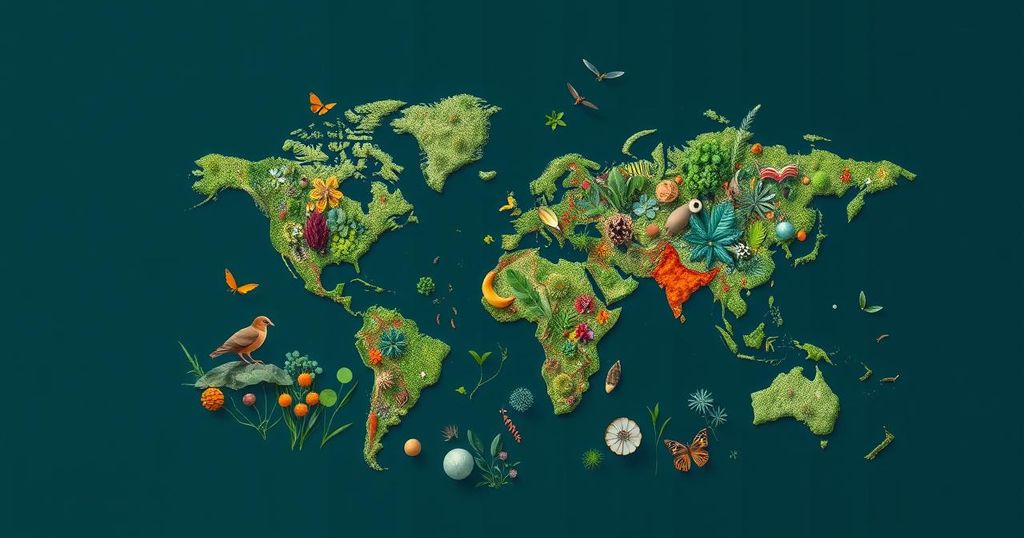Unified Action Required to Address Biodiversity and Climate Change Challenges at COP16

The 16th Conference of the Parties (COP16) to the Convention on Biological Diversity will be held in Cali, Colombia, from October 21 to November 1, 2024. The International Fund for Animal Welfare (IFAW) calls for international cooperation to tackle the connected crises of biodiversity loss and climate change. This conference represents a vital opportunity to align national and international efforts, especially in light of the forthcoming UNFCCC COP30. The protection of marine ecosystems and wildlife conservation will be emphasized during the event.
The upcoming 16th Conference of the Parties (COP16) to the Convention on Biological Diversity (CBD) is set to take place in Cali, Colombia from October 21 to November 1, 2024. As global leaders and environmental experts converge for this pivotal event, the International Fund for Animal Welfare (IFAW) emphasizes the critical need for robust international collaboration to address the simultaneous crises of biodiversity loss and climate change. Matt Collis, IFAW’s Senior Director of Policy, remarked, “We can’t solve either the climate crisis or biodiversity loss without addressing the other.” This conference presents a crucial opportunity to align national and international efforts focused on these interconnected issues. COP16 is the first of the major Rio Convention meetings in 2024 and is expected to greatly influence subsequent environmental negotiations. Next year will witness the landmark United Nations Framework Convention on Climate Change (UNFCCC) COP30, where nations must renew their commitments to combating climate change. IFAW advocates for the incorporation of commitments outlined in the 2023 COP28 Joint Statement on Climate, Nature, and People into the conference’s final deliberations, particularly through the formulation of the Cali Declaration. Among the fundamental topics to be addressed is the safeguarding of marine and coastal biodiversity. Such ecosystems are crucial not only for the myriad of species that inhabit them but also for their role in climate regulation by sequestering carbon and stabilizing weather systems. Collis emphasized this by stating, “Healthy oceans are the foundation of a healthy planet. They absorb carbon, mitigate climate impacts, and support rich biodiversity.” The urgency surrounding these challenges cannot be understated. As Matt Collis noted, “Time is running out to tackle the intertwined crises of biodiversity loss and climate change, but COP16 offers hope.” He asserts that the success of the conference could lead to significant advancements in aligning biodiversity and climate change initiatives at all levels, which is crucial for the future of Earth. Additionally, IFAW aims to spotlight the significance of wildlife in climate strategies during their official side event, titled “Leveraging wildlife conservation and rewilding to supercharge climate mitigation and adaptation,” scheduled for October 24 at 16:30 COT. This event will unveil new guidelines designed to assist governments in incorporating wildlife conservation into their climate action plans.
The interconnectedness of biodiversity and climate change poses a significant challenge for global leaders and policymakers. The UN Convention on Biological Diversity (CBD) serves as a framework for addressing these urgent issues. The upcoming COP16 in Colombia aims to foster dialogue and cooperation among nations, particularly as they prepare for the subsequent COP30 under the United Nations Framework Convention on Climate Change (UNFCCC). The effects of climate change are increasingly evident, and the degradation of biodiversity exacerbates these challenges. Conservation of marine ecosystems, vital for carbon sequestration and climate regulation, is critical as these areas face heightened threats from human activities and climate impacts.
In summary, COP16 represents a crucial opportunity for global leaders to unify efforts in addressing the dual crises of biodiversity loss and climate change. It is imperative that the outcomes of this summit not only honors prior commitments but also establishes a path for future environmental negotiations. The emphasis on marine biodiversity underscores the urgent need for protective measures in these essential ecosystems, and the IFAW’s role in promoting wildlife conservation further highlights the interconnected nature of these issues. Moving forward, aligning biodiversity and climate action remains essential for ensuring a sustainable future for the planet.
Original Source: www.ifaw.org






